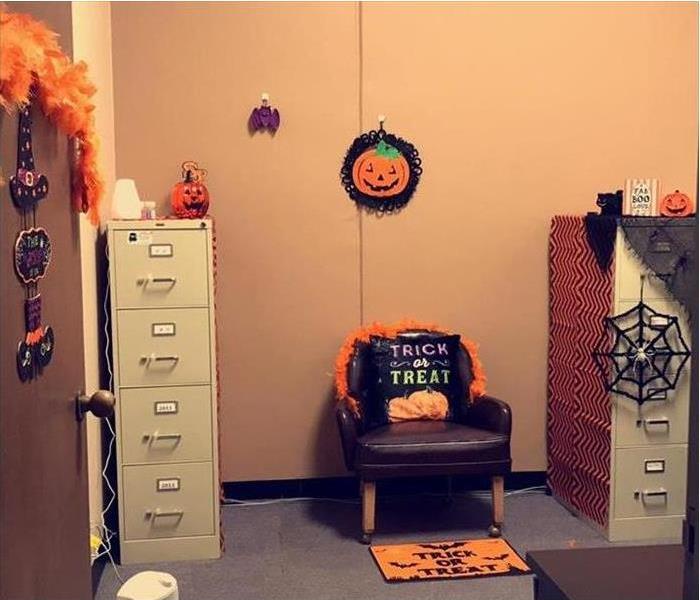Recent General Posts
How to Improve Tenant Retention
12/3/2024 (Permalink)
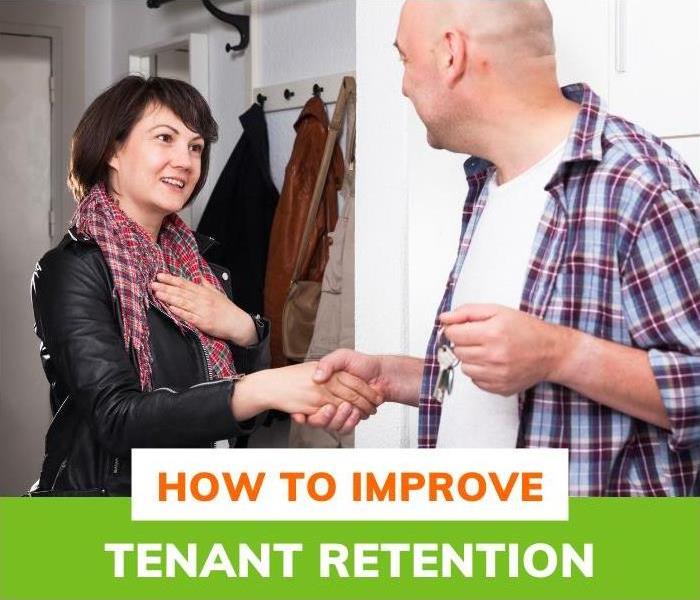 Tenant with landlord
Tenant with landlord
How to Improve Tenant Retention
High turnover costs make tenant retention important. Unit vacancies, marketing costs, and between-tenant cleanings all eat into your bottom line. That's why tenant retention is a hot topic among landlords and property managers. Ideally, you'll hang on to good tenants for as long as possible without needlessly "chasing them away" with how you run your property.
Of course, the truth is that no property manager can hold on to every great tenant forever. Tenants often leave for reasons that are beyond their control. However, high tenant turnover is avoidable. At a typical residential real estate property, the retention rate is around 50%. If you can get yours to 60% to 65%, your rental property will be ahead of most.
Here's a look at six tips for how to improve tenant retention.
1. Price Rent Fairly
Is high rent chasing tenants away? If you've noticed tenants renewing their leases at a lower rate than usual, rent costs could be blamed. You may have elevated your rental price at a faster pace than competitors. Analyze where your rent falls based on comparable properties in your rental market.
Tenants have more access to price comparisons than ever before. Even happy tenants won't stay if it means paying more for the same general location and square footage. While lowering rental rates often feels like a step backward, boosting tenant retention rates could make you money in the long run.
2. Incentivize Lease Renewals
Entice tenants to renew by offering perks for loyalty. It's common for property management to offer discounts when tenants commit to renewals by a certain date. This generally means allowing tenants to lock in the current rate instead of being subject to the new tenant rental rate. Getting an early commitment also helps you to plan accordingly based on whether you'll need to list the apartment on rental websites. The ability to start marketing a unit early if a tenant won't be returning can help you avoid "lost months" caused by unexpected vacancies.
3. Help Tenants Build Positive Credit
A quality tenant may be more likely to stay if they feel they're getting a long-term benefit beyond getting the cheapest rental rate or high-end amenities. The truth is that many renters are working their way to homeownership. However, it may be a few years until that happens. One win-win situation for the landlord-tenant relationship is a credit-reporting program. Under this arrangement, on-time rental payments are reported to credit bureaus to help tenants build their credit scores.
Why is this such an important perk? One of the biggest complaints among renters is that they don't get any "points" for paying rent on time. With rental payments often equaling or eclipsing mortgages today, this is frustrating. Most property managers and landlords don't report positive rental histories because they don't want to be bothered. This is what makes this such an underused tool for tenant retention.
4. Reevaluate Your Approach to Maintenance
If you want to know how to improve tenant retention, the key is making a rental feel like home tenants don't want to leave. Maintenance plays a big role in this. Unfortunately, the stereotype of the "landlord special" for most apartment upgrades and maintenance requests is true at many properties. It's common for good tenants to leave because they're frustrated by the state of a property.
Maintenance should be a priority instead of an obligation. Start with an orderly, clear process for submitting maintenance requests. Next, have a system for keeping tenants updated on when requests are expected to be completed. It's also important that you have a qualified, professional maintenance person or team available to handle repairs and upgrades at your property. Many property managers try to handle maintenance on their own to save money. However, fast and high-quality maintenance should be considered an important investment in the overall financial health of your property.
Of course, maintenance isn't just about reacting when tenants make requests. You must proactively ensure your property is free of pests, mold, water damage, and other underlying problems. Owners of damaged properties need to handle remediation before even allowing tenants in.
5. Learn Why Tenants Are Leaving
High tenant turnover rates may be unavoidable in your market. However, you may lose good tenants because of what your property lacks without even knowing it. This is why tenant feedback is such an integral part of good property management. There are several ways to handle tenant feedback. The first is to consider an annual tenant survey. A 10-question survey about general satisfaction, quality of life, and likelihood of renewing provides a look into the tenant experience. It can also help you anticipate tenants renewing their leases or vacating within the next 12 months. Be sure to leave an open space for tenants to suggest what they'd like to see improved at the property.
6. Consider Being More Flexible With Reliable Tenants
This tip for how to improve tenant retention requires some judgment calls. Anyone in property management for a while knows that some renters are autopilot tenants. They send their rent check in on time, they never make complaints, and nobody ever complains about them. They are simply responsible renters who are trying to enjoy a good quality of life at your rental. There may be times when these tenants make special requests. For example, they may want a cat even though the lease agreement didn't include pets. They may want to paint the walls in the living room because they're tired of drab white walls. There may even be a rare time when an unexpected circumstance causes them to pay their rent late.
In most cases, there's more to lose by being rigid or penalizing these tenants than by being flexible. Make a policy of pulling up a tenant's rental history before passing automatic "no" responses. Think of the benefit of retaining a tenant for an extra three to five years simply because you said "yes" to painting a living room green. Additionally, think of the bad blood that is created if you charge a late fee or make a report to a credit bureau just because a tenant was a few days late on rent one time after several years of consistency. There's a good chance the tenant will care much less about respecting your property afterward. They may also feel inspired to start browsing rental listings in the area.
Happy Renters Are Good for Your Bottom Line
Getting tenants to renew doesn't have to feel like pulling teeth. The "secret tip" for improving tenant retention is creating a space where people want to live. This starts with creating a safe, clean, and inviting space where tenants don't feel like they're at the whims of their landlord when it comes to enjoying things like maintenance and amenities. If you need to make updates or repairs to enhance the quality of life at your rental property, SERVPRO® is here to address all of your remediation needs for fire, mold damage, water damage, and more. Our teams offer unmatched expertise and professionalism for jobs of every size. Contact us today!
Top Strategies for Enhancing Tenant Relations in Apartment Complexes
8/14/2024 (Permalink)
 Tenants meeting their landlord
Tenants meeting their landlord
Top Strategies for Enhancing Tenant Relations in Apartment Complexes
Relationships between landlords and tenants don't have to feel transactional. Being a likable, relatable, and approachable landlord creates a positive relationship with tenants that can lower your vacancy rate. Knowing the important aspects that make tenants want to rent from you is also helpful. Learn 10 ways to improve tenant relations in apartment buildings.
1. Resolve Maintenance Issues Quickly
Nothing creates a positive rental experience like quick, action-oriented responses to maintenance requests. Lingering leaks, broken appliances, or chirping fire alarms all leave tenants feeling powerless and frustrated. Every maintenance request that goes ignored feels like an insult. As a landlord, having a rock-solid protocol for maintenance issues with quick communication and turnaround time is important.
Quick maintenance responses don't just save your tenants from discomfort. You can prevent severe electrical or water-related damage to your property by addressing broken appliances or leaks. Being unresponsive to maintenance calls could cause you to miss the window of opportunity to handle emergency water removal promptly.
2. Solicit Feedback
One of the best ways to improve tenant relations in apartment buildings is to determine their current state. Are your tenants satisfied? Where do you have room for improvement? Consider putting out an annual survey to get feedback.
A simple survey can ask tenants to rate satisfaction levels on a scale of one to 10. Categories can include amenities, maintenance, landlord communication, and tidiness of the complex. You can also ask how likely they are to renew their lease or recommend the apartment complex to a friend.
3. Be Reachable
In an era of instant communication, having an unreachable landlord is frustrating. Being accessible using a variety of communication modes is important. Consider opening the lines of communication with the following:
- Email address specifically for tenant inquiries.
- Dedicated phone line for emergencies and urgent matters that can receive both calls and text messages.
- Office hours that allow tenants to schedule meetings to discuss concerns or issues.
When managing a larger complex, a property management software system that allows you to keep inquiries organized can be essential! Popular programs essentially allow you to create queued "tickets" for maintenance, issues, and other concerns.
4. Let Them Know How You're Keeping Them Safe
Safety is valued more than ever. Add value to your apartment complex by implementing gated entry, security cameras, or security guards that give tenants peace of mind. When safety-related incidents occur at your complex, consider hosting "town hall" meetings that allow people to voice their concerns and offer suggestions.
5. Offer a Crisp Lease Agreement
Clunky, vague lease agreements sour landlord and tenant relations from the start. While self-protection is a major aspect of your lease agreement, you also want to ensure that the document offers clarity and peace of mind for both parties. Be sure to plainly state the rights and responsibilities of both parties. Be sure to include policies and protocols for:
- Security deposit.
- Lease term.
- Rent amount and due date.
- Policies for repairs and maintenance.
- Pets.
- Parking space.
- Subletting.
- Breaking leases.
- Late payments.
- Maximum unit occupancy.
- Lease termination.
- Additional fees for lease violation.
Don't leave your tenants wondering what they really just signed. Go over the lease agreement with them in person to clarify any questions they may have. Your policy of transparency will start tenants off with positive perceptions.
6. Offer Flexible Lease Terms
Flexibility is one of the biggest draws for renters. Whether they are saving up for a down payment for a home of their own or picking up a job contract from out of state, renters don't always know how long they will need to stay. Offering month-to-month or half-year leases is a great way to make your complex desirable. You can also go in the other direction with flexibility.
Some renters actually want to be able to plant some semi-permanent roots because they like the stability a long-term rental provides. By offering two-year leases that lock in current rental rates, you can give those renters what they want while also ensuring that you won't have to deal with a vacancy for at least 24 months.
7. Don't Act Like You Own the Place
While local laws may give you the right to enter a tenant's apartment, being invasive should never be part of your policy. Nobody wants a landlord to storm in for no reason. Respect privacy concerns by respecting a tenant's space unless an emergency situation requires you to lawfully enter an occupied apartment. Always get confirmation if you need to access an apartment for maintenance or repairs. While a tenant may have requested maintenance in their unit, it still feels nice to know when that knock on the door will come instead of being caught by surprise.
8. Have Clear Parking Policies
Don't let the parking situation at your apartment complex feel like the Wild West. If possible, assigned parking is preferred. It's also helpful to have signs directing guests on where to park to avoid having guests constantly parking in designated tenant parking.
9. Provide Perks
A little customer service goes a long way at apartment complexes. As a landlord, you actually have the power to shape the lifestyle at your complex. Imagine how tenants would feel if complimentary coffee was offered in the lobby every morning. What about muffins and scones on Saturday mornings? Offering these little perks creates a concierge lifestyle for very little cost to you. These types of perks can also drum up a sense of community by inspiring tenants to spend a little extra time in the lobby or other communal space.
10. Start With a Welcome Gift
Make a great first impression by leaving a welcome gift waiting for each new tenant. Consider a fruit basket, door mat, or gift card to a local coffee shop to let them know that you're happy they chose your apartment complex. Your tenants will always remember how you made them feel appreciated on that first day they called your property home!
Final Thoughts on Ways to Improve Tenant Relations in Apartment Buildings
These 10 little things can all add up to a positive tenant experience! Of course, it can sometimes take just one negative impression to leave tenants with a bad feeling. If your complex has any common spaces or units needing remediation from water damage, fire damage, or mold, your tenants won't feel comfortable. Let SERVPRO of Arcadia bring our 30 years of expertise to a job of any size! Contact us today to get the issue taken care of quickly.
Best Practices for Effective HOA Management
8/12/2024 (Permalink)
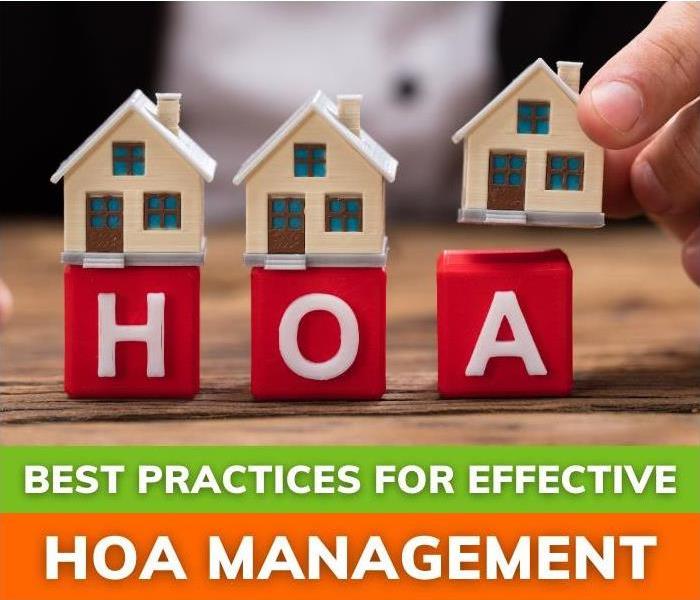 Top Tips for HOA Management
Top Tips for HOA Management
Best Practices for Effective HOA Management
Homeowners Associations (HOAs) are crucial in maintaining residential communities' quality and property values. Embracing best practices ensures an HOA can carry out this essential mission effectively and harmoniously. Understanding and implementing best practices can lead to a more engaged community and a positive, sustainable experience for all parties.
Best Practices in a Nutshell
HOA best practices are crucial for operating effectively and harmoniously within the community. They consist of a standardized set of proven strategies, guidelines, and procedures that ensure the HOA operates efficiently and effectively and fosters a positive community environment.
Best practices have many community benefits, such as operational transparency, which increases residents' confidence and trust. An HOA can also enjoy financial stability by adopting sound best financial practices to maintain a healthy budget and ensure that appropriate amounts are available for community maintenance, improvements, or emergencies.
Best practices can involve many techniques and approaches. The following options represent high-impact activities that provide an appreciable return for the effort invested.
Financial Reporting Transparency
HOA management's best practices include transparency in financial reporting, which is essential for maintaining accountability and trust within the community. HOAs can ensure financial transparency by publishing monthly financial statements and making them available for residents to review. These financial statements should use clear, detailed, and consistent accounting practices that do not vary from year to year.
The HOA's financials should be audited annually by an independent third party, such as a reputable CPA or an established accounting firm. The HOA can also hold a quarterly financial review meeting for residents. The meeting agenda can cover updates, explanations, and details behind various community budget allocations.
Proactive Maintenance Approach
An essential best practices task is to engage qualified contractors to handle routine tasks such as regular inspections and maintenance of common areas and community facilities. Additionally, it is vital to have resources such as expert contractors who can handle specialized functions from time to time, such as a fire restoration company.
The board can manage the HOA's budget by developing a maintenance schedule considering the community's long-term needs. It should prioritize preventative maintenance that will prevent costly repairs. This approach can minimize reactive maintenance, which can become extremely expensive for emergency repair work. It can also prolong the lifespan of the community's assets. Finally, a reserve must be created and funded to take care of significant repairs and pay for replacements.
Comprehensive Board Member Training
Board members serving for the HOA are volunteers, and members do not always have the appropriate training or experience to perform all aspects of their jobs effectively. One essential HOA management best practice is providing initial training and ongoing education for all board members.
Access relevant HOA management courses and resources and encourage members to attend HOA seminars and conferences. Topics can include HOA governance and legal issues. Additionally, workshops on essential topics such as financial management should be conducted for board members. For new board members, consider developing a mentorship program so that experienced members can pass along their knowledge.
Effective Conflict Resolution
Unfortunately, conflicts between residents and the HOA may come up from time to time. To effectively resolve these issues, management best practices, such as establishing a formal procedure for handling resident complaints, should be employed. Board members should undergo initial training in conflict resolution techniques and continuing education on practical resolution methods.
The HOA needs to keep thorough records documenting each conflict and its resolution. Another best practice is encouraging transparency and open dialogue throughout dispute resolution. For more difficult disputes, use a third-party mediation service to ensure fairness, transparency, and efficient resolution.
Regular Communication with Residents
Regular communication ensures residents are informed of community activities and decisions. Many HOAs mail a monthly newsletter that contains news and community updates. However, best practices require the HOA to have additional, regular communication channels with residents. For example, consider maintaining a regularly updated community website that relays current information to residents.
In addition, use social media and e-mail for time-sensitive announcements. Hold town hall meetings regularly to address resident concerns and implement a suggestion box so residents can provide input and feedback anonymously.
Consistently Enforced Rules and Regulations
Consistently enforce rules and regulations within the community to prevent conflicts. Communicating the rules to all residents is an essential part of implementing them. The board should regularly review and update the rules to reflect the community's needs. Some communities review rules and regulations every three years, involving residents to ensure reasonableness and applicability to the community's current status.
Ensure the HOA applies rules and regulations uniformly across all residents, with no favoritism. Equally important is providing an appeal process that is transparent and fair. Maintain documentation on all violations and actions the HOA has taken to keep records of enforcement consistency and fair handling.
Property Management Software
Property management software has been developed to help HOAs streamline tasks and improve efficiency. HOA management best practices call for regular financial reporting, which can be produced and maintained easily within property management software. These software packages often have several report templates that can save time and create useful financial reports.
The software also allows maintenance requests and tracking of related work orders. It also increases the efficiency of administrative tasks, such as analyzing data to help the board make informed management decisions. Additionally, the software can facilitate interaction with residents by providing features such as online payments and communications.
Initiatives For Community Engagement And Involvement
Getting the community engaged and involved can create a sense of belonging for residents and strengthen relationships within the community. An HOA can achieve this by organizing regular neighborhood activities and social events, such as holiday or weekend barbecues in a common area or nearby park.
To increase community involvement, the HOA can create committees that include residents in decision-making for the community and encourage feedback through regular meetings and online or mailed surveys. The HOA can also promote opportunities for residents to volunteer and help within their community and provide recognition for community achievements and volunteer contributions.
Invest in a More Connected, Harmonious Community
By incorporating some of these best practices into your HOA's routines, the board and the community can enjoy more efficiency, transparency, and harmony. These approaches enhance residents' trust and confidence in their HOA and contribute to the community's long-term prosperity and sustainability.
When your HOA needs specialized expertise, such as SERVPRO® mold removal service, do not hesitate to contact our expert plumbing and restoration technicians to see how we can help.
Creative Incentives to Attract New Renters
6/12/2024 (Permalink)
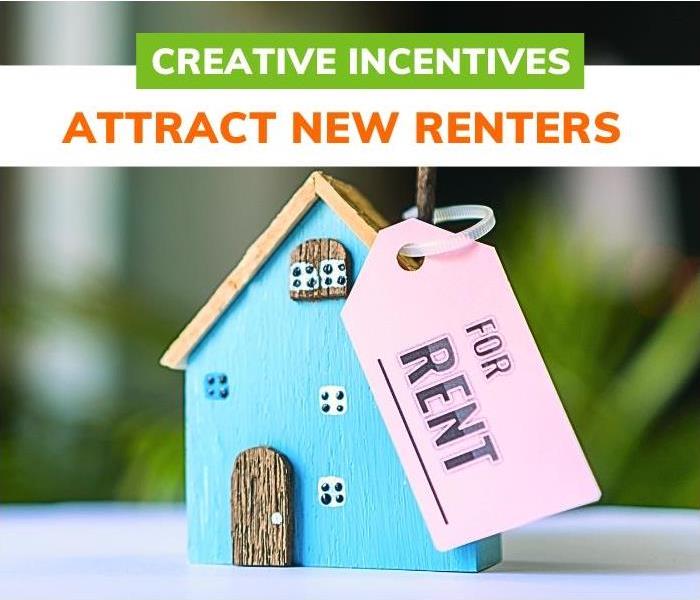 Incentives to Attract Renters
Incentives to Attract Renters
Great renters make running a rental property easy! However, attracting quality tenants requires work. With so many choices, renters sometimes need a little push to sign a lease. "Sweetening" the deal using leasing incentives for apartments can help. While you don't have to break your budget to be able to incentivize renters, it's important to remember that leaning into incentives can help you enjoy reliable long-term tenants instead of pouring money into constantly cycling through unit vacancies. This guide to seven easy renter incentives will help you to get high-quality tenants to commit.
- Free Parking
Including free parking in a lease agreement is a major incentive! For many renters in cities, enjoying safe off-street parking is a priority. If free parking is too far for your operational budget, consider offering discounted parking that lets tenants park their vehicles in a covered parking lot for a cheaper rate compared to competing properties.
- No Pet Fees
Finding pet-friendly apartments is a challenge for renters. Many resent the fact that they often have to pay a larger security deposit or higher monthly rental rate just for the privilege of being able to have a cherished four-legged family member live with them. One great way to stand out in the local rental market is to waive all pet fees. This is one of the best ways to have new renters practically lining up outside your door!
If you're going to pivot to waiving pet fees as one of your leasing incentives for apartments, you might want to consider making some alterations to your units first. If your units are currently carpeted, you could save money in the long run by upgrading to tile flooring that pets won't destroy. Property managers offering pet-friendly apartments generally charge more to account for the extra wear and tear that pets leave behind in apartments. Most actually replace carpets after pet owners move out. Tile will ensure you can get decades out of a single floor.
- Reduced Security Deposits
Moving is expensive. The average renter spends thousands of dollars per move when accounting for the security deposit, first month's rent, moving trucks, new furniture, and new household wares. A renter in the middle of a move appreciates a little relief whenever they can get it! That's why a reduced security deposit for qualifying renters is one of the most elite leasing incentives for apartments. This can also be an incredible strategy for attracting reliable tenants.
Let's talk about how to structure this incentive. There's no need to reduce or waive security deposits across the board. This can be a perk reserved for lease applications with credit scores that meet a certain threshold.
- Flexible Lease Terms
One of the biggest sources of anxiety when signing a lease is committing to a contract for a full year. What if you could attract tenants by alleviating that stress? For many people, the nature of their professional lives means contract work, semester-related assignments, or personal transitions. Very few circumstances in life fit neatly into a 12-month box. By offering flexible lease terms, you may attract dependable tenants needing shorter or irregular lease terms that won't force them to pay penalties.
"Flexible" doesn't always mean short! For example, a person taking a work contract may feel stuck in the middle because they plan to live in a city for 18 months. While you'll get a full year of paid rent from this tenant, they may be apprehensive about what will happen when they need to move out more than halfway through the second year's lease. Your flexible lease terms can allow both of you to "win" by creating clear and detailed lease details that allow for an irregular lease period.
- Rent Discounts for Renewals
The best leasing incentives for apartments sometimes allow tenants to look into the future to see ongoing savings. You don't necessarily need to offer an incentive that benefits a renter from the beginning. One smart strategy that inspires new leases and resident retention is offering ongoing discounts for recurrent renters. If you're like most property managers, you increase rental rates every year. Consider freezing rental rates for five years for each tenant after a lease is signed. This puts a renter in the position of not being able to find a better deal in town by the time their lease is up! They will also feel encouraged by the fact that they are paying less compared to the new tenant moving in next door after the first, second, third, fourth, and fifth year.
Some property managers take a slightly different approach to lease renewal incentives. While you may still want to increase rental rates for all tenants, you can consider offering a lower increase for renewals than newly signed leases. The bottom line is that renters appreciate renewal discounts because this gives them the sense that they have locked in a good rate that insulates them against rising rental prices.
- Laundry in Each Unit
Heading to a shared laundry room is considered a major hassle among renters. That's why you might consider adding a unit washer and dryer to each apartment in your complex. Seeing an in-unit washer and dryer setup in an apartment ad is a major incentive for busy renters!
- Apartments That Feel "New"
While many landlords assume that they can entice renters with gift cards or grocery deliveries, the truth is that most people just want a safe, attractive place to live. Nobody likes to feel like they're moving into a unit that simply feels like it's been recycled from the previous tenant. That's why having a like-new interior in a unit when it's time for a prospective tenant to walk through is so important! In addition to cosmetic updates, correcting any issues from fire or water loss before opening an apartment for viewing is essential. You can also sweeten the deal by guaranteeing all appliances are under five years old.
Final Thoughts on Good Leasing Incentives for Property Owners
Property owners struggling to stand out in the rental real estate market can dramatically improve their situation using incentives. However, luring potential tenants with big promises will only waste your time and money if you don't have quality units to back them up! If your building in Arcadia needs remediation, don't hesitate to contact SERVPRO® for all your cleanup and restoration needs.
Creative Strategies to Boost Tenant Retention
3/7/2024 (Permalink)
 Happy tenants
Happy tenants
Creative Strategies to Boost Tenant Retention
Tenant retention is one of the keys to maintaining cash flow at a rental property. Vacancy doesn't just harm landlords by making a unit unprofitable for every month it remains empty. Chronic rental vacancies also cost landlords because they require them to spend time and money on marketing and tenant screening. This article looks at the best ways to improve tenant retention.
- Create a Safe Setting
Safety has never been a bigger priority among tenants. Unfortunately, many rental properties leave tenants feeling vulnerable. Some ways to make tenants feel safe include:
- Having surveillance cameras in place in strategic public areas of a property.
- Upgrading locks and deadbolts with the latest technology.
- Having visitor protocols in place to prevent entry to tenant-only zones of a property.
- Having generators standing by for power outages.
- Having plans in place for weather responses or evacuations.
- Hiring security guards for larger complexes.
- Making sure that all doorbells and call boxes are in working order.
A property owner can also consider having annual "town hall" meetings that address safety concerns among the tenant community. This allows tenants to voice their opinions about how you can make them feel safer. After all, nobody sees the potential for safety breaches like the people living on the property daily. Even landlords who don't have formal meetings can consider opening a special email account or hotline that can be used to voice safety concerns.
- Keep Rent Consistent
It's unavoidable that landlords need to increase rents occasionally to keep up with expenses. However, tenants can smell opportunistic landlords a mile away. Play the long game by only making incremental rental increases when necessary. Even tenants who can afford increased rates will often move out of spite or anger when they feel they are being taken advantage of by landlords who are raising prices just because they can. Before deciding about a rent increase, it's important to analyze the potential for increased revenue against the losses if even just 5% of tenants decide not to renew in response.
- Incentive Loyalty
There are some easy things landlords can do for their tenants that will keep them in their apartments longer. One painless way to improve tenant retention is to offer to report on-time rental payments to credit bureaus to help tenants build up a positive credit history. This kind gesture can secure a dependable tenant for several years while they attempt to repair less-than-great credit.
Another great way to lock tenants in is to offer discounts when they renew by a certain deadline. As a lease comes to an end, a tenant may begin looking around the area to see what their options are. By giving a tenant a letter letting them know they can save a specific amount by renewing by a certain deadline, you're applying pressure to renew quickly in the kindest way possible! Renewal discounts help tenants feel like they are getting financial benefits. For landlords who feel apprehensive about losing income by offering discounts, it's important to remember that just one month of vacancy for a unit can more than wipe away any potential earnings you'd make at the higher rate.
- Be Your Own Quality Inspector
Many long-time renters are so used to "chasing around" landlords to get repairs done that they consider it a breath of fresh air when a property owner takes a proactive approach to maintaining units. Create a calendar for routine inspections that allows you to find maintenance issues before they become big problems. In addition to providing tenants with a better quality of life, this approach also saves you money in the long run by fixing wear and tear, minor leaks, busted appliances, and other common issues before they become expensive problems.
Even more important than the material benefit of staying ahead of repairs is the fact that being concerned about a tenant's living space builds trust. This is especially true when it comes to repairing structural issues or managing mold remediation. In addition to turning off tenants, visible signs of damage and mold cause legal consequences for a property owner.
- Train Your Staff in Customer Service
It's far too common for property managers and their staff to act as though they are doing tenants "a favor" every time they interact with them. The truth is that responding to maintenance requests and handling safety concerns are far from favors. These tasks simply represent the property owner upholding their end of the contract! A tenant is far more likely to stay in a rental when they feel like they are receiving good customer service instead of constantly battling just to get what they are legally entitled to through their lease agreement. Some ways to prioritize customer service in the tenant experience include:
- Providing specific appointments for scheduled maintenance instead of broad windows.
- Ensuring that maintenance staff members always knock before entering instead of merely using their keys to get into a unit.
- Providing friendly reminders about new rules or protocol updates in writing.
- Keeping office hours that allow tenants to speak with a representative in person.
The importance of simply being heard regarding tenant retention cannot be overstated! While the staff member on duty may not always be able to provide a fast solution for every tenant issue, they can at least assure that the matter will be handled. Remember that a rental is never just a rental to a tenant. While they may not own a unit, the need to feel safe and comfortable in their home can bring strong feelings to the surface.
- Remember Birthdays
There's a reason why people who deal in sales routinely send gifts to their clients and leads. These gestures create a connection. How does that translate for property owners and tenants? One simple way to ensure every tenant feels appreciated is to send them a card on their birthday. You can also consider sending a gift card. This simple gesture can be a great way to strengthen the tenant-landlord relationship by making each tenant feel like more than just an anonymous name on a lease.
- Create a Sense of Community
Liking your neighbors is a great reason not to move. That's why one fun way to create happy tenants is to host community events. Movie nights, barbeques, pool parties, and other planned events that use your property's amenities are perfect for socializing. If you have a large enough tenant population, it's also worth considering offering ongoing events throughout the month as part of a robust "lifestyle" calendar. Some options might include workout classes, book clubs, dance classes, and skill-building workshops.
Make Your Property a Place People Want to Call Home
The bottom line is that your rental property needs to be the place that people want to return to at the end of the day if your goal is to improve tenant retention. Retaining tenants comes down to creating an environment that's accommodating and safe. If you're struggling with high tenant turnover because your property has earned a reputation for poor upkeep due to visible or odorous mold, it's time to take action. Contact SERVPRO® mold services today to get your property on track to becoming a place tenants are proud to live.
Effective Ways to Resolve HOA Complaints
2/19/2024 (Permalink)
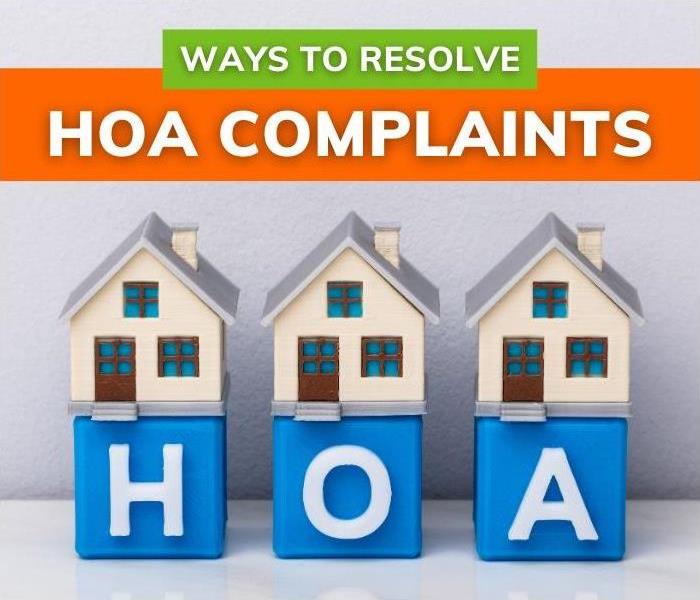 Transform your approach to handling HOA disputes with our detailed guide.
Transform your approach to handling HOA disputes with our detailed guide.
Living in a homeowners' association (HOA) managed community offers residents many benefits but is not without challenges. From parking issues to abandoned doggy doo in shared areas and other problems, the variety of complaints covers a lot of ground. When residents express their grievances to the HOA, each complaint warrants communication, careful consideration, and effective strategies to resolve the issues. When the HOA board focuses on how to resolve HOA complaints instead of ignoring or minimizing them, the result is a better community for everyone.
Parking Issues
In some HOA communities, street parking may be in short supply, causing complaints about the limited parking spot availability. Sometimes, people park on the streets in ways that block neighboring driveways. Residents may also park their cars in guest spots instead of their driveway or garage. They might also park an extra, rarely-used vehicle on the street and not move it for extended periods. Finally, unauthorized vehicles that don't seem to belong to residents, but take up valuable street or guest parking, also trigger complaints.
HOAs must provide clear signage to state the community’s rules for parking and enforce those rules or regulations consistently for them to have an effect. Other potential solutions include adding more parking areas designated for guests or issuing parking permits to monitor and effectively manage community parking.
Noise Problems
Neighbors can disrupt the peace by generating excessive noise, from loud music late at night to using noisy equipment in their yard or garage early in the morning. Another common complaint is continual barking from dogs who spend much time in the backyard.
When considering how to resolve HOA complaints about noise, HOAs can establish specific quiet hours for the community and encourage respectful communication between neighbors to resolve issues. Consider implementing a formal process for residents to lodge noise complaints for repeat disturbances.
Problems with Pets
The barking dog is cliché, but many other complaints also come up about neighborhood dogs. Some residents like to walk their dogs off-leash, which can endanger other pets, especially smaller breeds. Some neighbors do not pick up after their pets and leave pet feces on neighbors’ lawns or in common areas for others to deal with.
To resolve these complaints, establish pet regulations and enforce them consistently. Consider installing pet waste-bag stations with trash cans in key areas so residents can use tools to clean up after their pets. In the community newsletter, offer training resources and educational articles to inform pet owners and consider a program to require pet registration.
Neglected Maintenance
Residents may become concerned and lodge complaints if they feel the community upkeep is not up to par, such as overgrown common-area landscaping that blocks walkways, burned-out lights left unrepaired, and buildings with dirty or aged exteriors.
To resolve these issues, put maintenance on a regular schedule and include routine inspections. Promptly handle issues reported by residents and ensure that the HOA can cover maintenance costs by allocating sufficient budget dollars to the community’s upkeep.
Architectural Violations
Neighbors often complain when they see a resident changing their property without proper approval. These alterations can include unauthorized plantings in the front yard or paint colors that are not on the “approved” list. It also includes any structural modifications that have not received approval. For example, a homeowner may add a deck to their house without adhering to the HOA’s defined guidelines.
To resolve these complaints, the HOA can educate residents on the appropriate architectural guidelines for the community. It can also provide homeowners with resources and steps to get approval for home modifications. Conduct regular inspections and institute penalties for any violations to enforce compliance with the guidelines.
Misuse of Community Amenities
This common complaint usually involves reports of community amenities being abused or misused. Examples include residents having parties in common areas without getting proper approval or non-residents using pool and barbecue areas or the community clubhouse without prior permission. Some communities with locked pool areas have issues with residents making key copies for non-residents and their children to use the pool.
To resolve these complaints, the HOA must monitor the amenities regularly to enforce HOA rules. To prevent misuse and keep non-residents from accessing the amenities, consider a reservation system and access controls such as keys or key cards where possible. Use an electronic lock to track which keys are used to access the areas, and assign serial numbers to keys to prevent duplication.
Neighbor Disputes
Conflicts between neighbors can trigger complaints, such as disagreements over shared areas, property boundary disputes, and noise issues. After a disaster situation, such as a fire that involves more than one home, the HOA, and homeowners may have disputes over which insurance company should cover the fire damage and safety concerns that arise during fire restoration work, such as who covers the costs, work delays and questions about the work quality.
When resolving HOA complaints, maintaining open, clear, and transparent communication is the best way to minimize disputes and misunderstandings. The HOA can offer mediation services and other resources for neighbors with difficulties resolving a dispute amicably. Communication is also key for issues such as fire restoration involving multiple homeowners and the HOA.
Taking prompt action and coordinating between homeowners, insurance providers, restoration contractors, and the HOA board can ease many concerns and ensure residents that the damaged properties will be restored to pre-fire conditions as quickly and satisfactorily as possible.
Ensuring Harmony in the Community
In many ways, the HOA acts as a peacekeeper for the community, making it vital to proactively manage and address resident complaints. With clear communication, diligence, and a focus on fair outcomes, the HOA can offer constructive solutions to resident complaints. Enforceable regulations and other strategies can minimize conflicts while upholding the community’s collective well-being. Let SERVPRO Arcadia be part of the solution by offering high-quality, professional fire restoration and other services to HOAs to restore property values and family routines. Contact us today for more information!
Marketing Ideas for Property Managers
2/16/2024 (Permalink)
 Effective Marketing Techniques for Property Management Success
Effective Marketing Techniques for Property Management Success
When you really think about it, running a successful property management business is all about marketing. A piece of real estate is what it is – a piece of real property. The role of property management companies is to market the features of real estate to generate demand from high-quality tenants and manage the needs of each tenant and property.
Property owners need to show prospective tenants why they should choose a particular property over other options, but more importantly, why they should want to choose a particular property over others. In a sense, this type of marketing is about demand generation just as much as lead generation.
Unfortunately, property management marketing ideas can be hard to come by when you’re busy. Trying to put all of your ideas together in one plan can feel like you’re always playing catch up, especially in high-competition areas. While you’re busy trying to find innovative marketing ideas, you also have to contend with repairs, tenant concerns, rent collection, tax and insurance issues, and more.
We’re Here to Help
To help you save time and expand your marketing efforts, we’ve put together some simple property management marketing ideas you can begin to implement this week. Remember that property marketing in the real estate business is an ever-evolving journey, and no one solution will be a silver bullet; however, these marketing ideas, when implemented with consistency, can go a long way in generating leads for months or even years to come.
Rely on Your Website to Do the Work for You
If you’re serious about property management, you no doubt have a website for your company. While having a website is a great start, you won’t get the most out of it without investing in digital marketing. Search engine optimization (SEO) is a crucial component for digital marketing and website success in the crowded property management field, and local SEO is even more important.
SEO and your website work hand in hand to bring more relevant traffic to your site. Also, SEO strategies can help your property management website rank higher in search results. This means getting your site and properties in front of local people who are already searching for places to lease.
Resources like blog posts add to your website's value and create opportunities to develop backlinks that point to your site. Search engines typically value websites with lots of high-quality backlinks, and your backlink profile can be a ranking factor when your website comes up in local search results for properties for lease.
Consider Online Ads
Another way to attract digital leads is to place web ads through search engines, social media, and industry publications. Online paid ads can be effective property management marketing ideas because they allow you to choose who sees your ads and on what platforms.
Most digital advertising platforms let you select various factors to create a target audience. Some of these factors may include age, location, income level, and hobbies or interests. By selecting the right demographic information for your target audience, you can ensure that the right people see your ads for your location and type of property.
Use Social Media
You can also use social media marketing to engage with prospective and current tenants. Social media platforms like Facebook and Instagram allow you to showcase your properties and present opportunities to show off your company’s personality and style.
Social media profiles are great places to list openings, discuss the benefits of communities around your properties, or update tenants on the latest news. For instance, if you’ve recently had water damage restoration completed at a multi-unit rental property, use social media to share before-and-after pics so that your tenants can see that you’re on top of things. This type of social media content can also help to strengthen the bonds between your company and its tenants.
Solicit Online Reviews
Online reviews are great property management marketing ideas as they allow your tenants to do the marketing for you. Soliciting online reviews from happy tenants and displaying these reviews on the web is a fanatic way to build social proof. People tend to trust the opinions of others when it comes to making purchasing decisions, and a glowing online review can go a long way in building trust with minimal work on your part.
You’re encouraged to be cautious, however, as negative online reviews can be quite detrimental to your plans. Unfortunately, people tend to only leave online reviews when they’ve had negative experiences, and if someone sees many negative experiences associated with your company, they’re likely to steer clear.
If you come across negative reviews, you can combat them by responding promptly but always remaining professional. Demonstrate in your response that your company is committed to making things right if something goes wrong on your end, and encourage private contact between your company and the person who left the review.
Partner With Local Businesses
If you’re looking for offline marketing ideas for your property management business, or if you’re seeking hybrid marketing ideas that combine online and offline strategies, consider partnering with local businesses. For maximum effect, try to find businesses that complement your own.
For instance, consider what your tenants may need when they start planning a move. A moving or supply company would likely fit the bill here, so see what you can do to establish relationships with moving companies or supply companies in the area.
You can then try to find ways to market your business through these partnerships. An example of this may be when you agree to provide branded promotional materials as welcome gifts to a moving supply company. That moving supply company then hands these out to people purchasing packing supplies. The potential exists for someone to see your property management company as they are packing to move and consider contacting your company to see if opportunities are available.
Measure Your Success
No matter what methods you use to market your property management company, measuring success is important. Keeping track of metrics on a regular basis allows you to see what’s working and what may need adjusting. Having access to metrics and knowing what you plan to measure and why can help your company focus its marketing strategy for more effective results.
Protect Your Investment and Keep Tenants Happy With SERVPRO of Arcadia
At SERVPRO, our team is here to make your job easier. We provide property managers with fast response services for fire restoration, mold remediation, and more to ensure your tenants are safe and your properties stay protected. To learn more about SERVPRO restoration, call our team in Arcadia, or use our contact form to reach us online right now.
Cybersecurity Basics for Property Managers
2/9/2024 (Permalink)
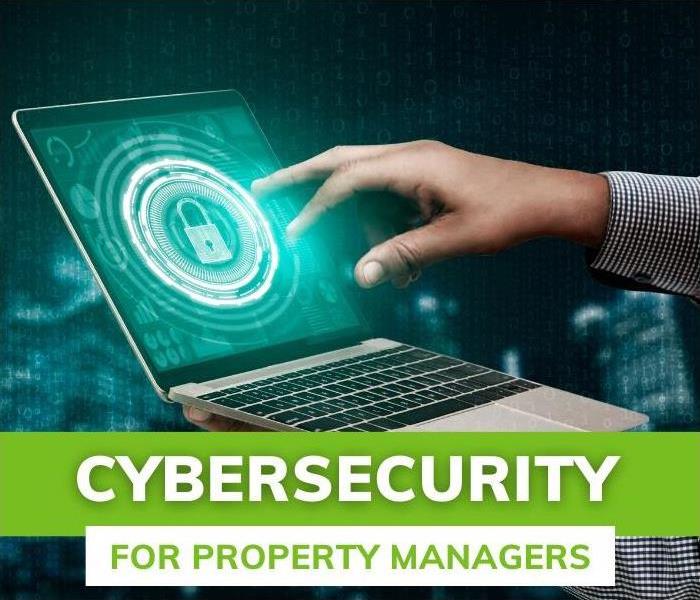 Explore essential cybersecurity strategies for property managers.
Explore essential cybersecurity strategies for property managers.
Property managers wear many hats whether they're responsible for large commercial complexes, multiunit residential properties, mixed-use facilities, or any other property. From managing occupancy rates to handling day-to-day operations or even hiring a water damage restoration company after a major incident, the eyes of tenants, employees, and stakeholders all turn to the property manager. With all of that on their collective plates, it's easy to see how cybersecurity takes a back seat for most property managers.
However, the unintended consequence of that lack of prioritization is a significant increase in the potential liability should a cyber incident occur. Cyber attackers frequently target property management companies, real estate companies, and other related industries Due to the sheer quantity of sensitive information that they possess. For that same reason, data breaches in those industries come rife with negative consequences. You could be facing civil liability, regulatory fines, restitution, and the reputational damage your company would incur from a reported breach.
What Information Should Be Secured?
Without basic training in cybersecurity for property managers, it's likely that they don't even know why they could be targeted for a cyber attack. Property management systems, in particular, provide a mouthwatering target for cybercriminals. Tenants' personal information is sometimes one-sided, with maintenance requests, operational technology, contract details, etc. Cybersecurity risks abound, and high-risk industries like real estate must become proficient in managing those risks.
Property Management Cybersecurity Basics
To that end, we've compiled some of the cybersecurity best practices you can implement to protect your sensitive information from being compromised in a data breach.
Conduct Cyber Risk Assessments
We just mentioned how prevalent cybersecurity risks can be, and you can't possibly mitigate those risks if you don't know where your exposure is. Regular cyber risk assessments should be conducted whether you use a vendor or your in-house personnel. You should evaluate what kind of data you store and utilize, how it's transmitted and backed up, who has access to the sensitive information, and what monitoring solutions are in place. Once you have identified the risks, you can then focus on narrowing the attack surface by enforcing things like multifactor authentication.
Educate All Staff
Just like training in cybersecurity for property managers is essential, all employees need to have a basic understanding of cybersecurity as well. This should include training on possible threat vectors, sensitive information that is at risk, your enterprise's cybersecurity policies, and why those policies are in place. Including the reasoning behind your policies as a part of your training regimen not only makes your staff well-informed but also increases the likelihood that they will then comply with those policies. It's also critical to realize that this training is an ongoing effort. Initial training should be provided during onboarding, but cybersecurity training should be a recurring effort that includes hands-on practical exercises and tests.
Establish Role-based Permissions
Regardless of the size of your company, you should implement system access controls using role-based permissions. This means that instead of applying individual permissions to each user as you add them, you create defined roles within your network that have preset access limits and permitted functions assigned to them. As you create new users, you assign them a role, and all of the permissions associated with that role are automatically applied.
This also reduces the risk of making a mistake when creating a new user and has the added benefit of streamlining the process during onboarding. These roles should be defined using principles of least access, meaning that personnel should only have access to the sensitive data and other information that they truly need to accomplish their assigned tasks. All users should require multifactor authentication to access company networks.
Audit Your System
This applies to both real-time monitoring and true audits. You want to make sure that network activity is within normal parameters. This means tracking and auditing access logs, purchases, and other critical databases to ensure that suspicious activity is not missed. You can leverage software solutions to help you accomplish this task, and some of the best programs out there can learn the patterns of activity across your systems and identify behavior that is outside system norms.
Purge Data and Users
Depending on your enterprise's area, you may encounter applicable data privacy laws that govern what sensitive information or personal data you can request, maintain, and use, as well as rules governing how long you can hold onto that data. Many data privacy laws also require responsible disposal of that sensitive information once it is no longer needed or must otherwise be purged. In addition to cycling out old personal data for tenants and others, you should immediately lock out employees upon their separation from employment. Even if the parting was amicable, the potential for cybersecurity risks with former user accounts still being active is far too high. That doesn't begin to consider the malicious insider threat that could be present.
Encryption
Shockingly, most companies, including real estate property management organizations, do not use encryption regularly. When you have sensitive data, effectively using encryption should be one of the first steps you should take. End-to-end encryption may seem unnecessary, but when you hold payment data for rent payments, personal data of tenants, contractors, employees, and other sensitive information, many regulatory bodies require that you use encryption. Even if they don't, failure to properly protect this information during a data breach can lead to serious consequences. Should you suffer a data breach, it's far better that the attackers find themselves to be the new owners of what appears to be gibberish rather than lists of tenant bank accounts and routing numbers.
Regarding real estate and property management, cybersecurity isn't your only concern. If you suffer a devastating leak, fire, or even storm damage, SERVPRO cleaning can get you back on track and back in your home or property. With residential and commercial experience, SERVPRO has the knowledge and equipment to make your property look like the incident never happened. We can even help manage the insurance process. Contact us today to see exactly how we can help you.
Multi-Unit Property Management Best Practices
2/6/2024 (Permalink)
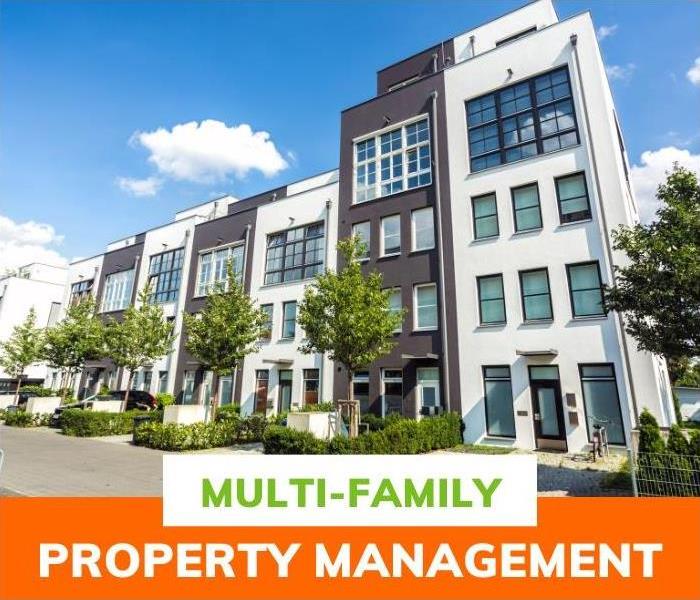 Learn essential tips for multi-family property management.
Learn essential tips for multi-family property management.
Managing a multi-unit property is a big job but can also come with big rewards. According to some salary sites on the web, property managers for multi-family unit properties can earn upwards of $85,000 annually, and this is on top of the satisfaction that comes along with knowing you’re helping others to live richer, fuller lives.
Although multi-family property management best practices are very similar to those used in managing single-occupancy dwellings, some special considerations come along with managing multi-unit properties. If you’re considering moving into management for multi-family properties or are considering upgrading your current property management career to include multi-unit properties, below are some best practices to keep in mind:
Establish Clear Communication From the Outset of Tenant Relationships
The most important thing you can do as a multi-family property manager is establish and support clear communication from the outset of any lease agreement. Maintaining clear communication can help your property management company avoid legal issues and can help avoid conflicts surrounding matters like rent payments. When you support strong communication, you have the opportunity to avoid tenant relationship breakdowns and conflict.
It’s also worth noting that you’ll likely end up working with many different people over the course of your career, all of whom will have their own personalities and styles of communication. To make things run smoothly between all of these different personalities, it’s a good idea to have a written policy on tenant communication in place. This document isn’t meant to govern how tenants communicate with staff, but instead, it should lay out acceptable forms of communication for different concerns.
For example, matters regarding rent or repair disputes should be submitted in writing to establish a paper trail. Conversely, you may decide it’s best to discuss matters involving neighbor disputes in person with a witness present. No matter how you decide to lay out your communication policy, document it and present your requirements to tenants before they sign leases.
Take Care of Maintenance and Repair Requests Quickly
Addressing maintenance and repairs promptly according to the terms of a lease agreement is vital for maintaining trust with your tenants. This is especially true in cases where property damage may affect tenants' quality of life, such as after a fire. You’ll want to seek out fire damage restoration services quickly in a case like this since damage after a fire may pose a health hazard to tenants. Also, by taking care of property maintenance issues quickly, you build trust with tenants and reduce disruptions to your daily workflow.
Maintenance and safety issues may also be matters of the law. Most states have specific laws regarding tenant rights and landlord obligations. If you or your property management company do not uphold a tenant’s rights or fulfill your obligations, the issue may end up in court. Losing a legal battle can result in fines, fees, and damage to your professional reputation. When you stay on top of maintenance and repair requests, you avoid these issues and may even boost your reputation.
Have a Screening Process in Place for Tenants
A comprehensive tenant screening process is vital among other multi-family property management best practices. When you screen tenants for suitability, you reduce the chances of dealing with headaches and conflicts over issues like rent collection, and you’re less likely to experience tenant retention challenges.
Tenant screening is also good for tenants so they don’t end up renting units for which they are not financially suited. Of course, you must follow state and federal housing guidelines when screening tenants, but having measures in place to ensure a thriving community will benefit you and your tenants.
When designing a screening process, set reasonable requirements that factor in the possibility of past mistakes. No one is perfect, and people change. You need to protect the integrity of your property and look out for the safety and well-being of all tenants. Still, you don’t want your screening process to become so stringent that it alienates otherwise viable renters.
Use Tech Tools for Efficiency and Safety
The use of technology like property management software is also among the top multi-family property management best practices for real estate professionals. Successful property management is all about efficiency when dealing with multi-family dwellings. As a property owner or manager, you will likely be dealing with numerous requests from multiple tenants daily, so anything you can do to maximize productivity during your workday is good. The software allows you to keep track of all of your rental properties from one place, and many programs provide access to budgeting tools to monitor cash flow.
Security technology is also a good investment for multi-unit properties. These types of properties are often large and sprawling, meaning there’s lots of ground to cover. Installing security cameras and quality lighting in strategic areas around your entire property can serve as a deterrent to criminals, and it can also be a benefit if a matter needs to be investigated in the future.
Consider installing door access technology that lets tenants come and go by swiping an electronic keycard. This can prevent unauthorized individuals from gaining access to your properties. When integrated with property management software and Internet of Things (IoT) technologies, these elements add an additional layer of security to protect tenants and your properties.
Contact the Experts at SERVPRO Arcadia to Learn More About
SERVPRO Arcadia is your partner for successful property management. SERVPRO restoration services are the perfect complement to multi-family property management best practices, and we’re here for you for fire damage repair, mold remediation, storm damage cleanup, and more.
Strategies for Effective HOA Vendor Selection
1/24/2024 (Permalink)
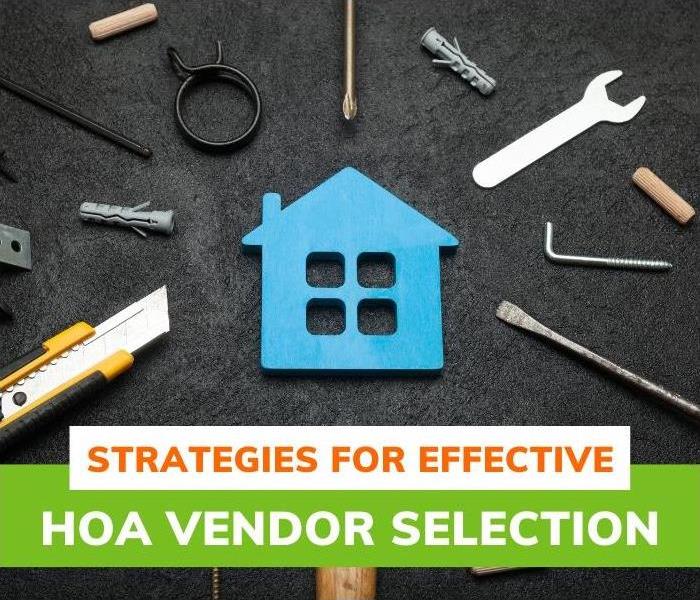 Effective HOA vendor selection made easy! Explore our expert tips on due diligence, cost-effectiveness, and maintaining strong vendor relationships.
Effective HOA vendor selection made easy! Explore our expert tips on due diligence, cost-effectiveness, and maintaining strong vendor relationships.
Selecting vendors for a Homeowners Association (HOA) is a multifaceted task combining analytical decision-making and nuanced human judgment. This intricate process entails weighing various dynamic factors to ensure optimal vendor choice.
Leveraging HOA Documents for Guidance
The vendor selection process begins by consulting the HOA’s governing documents. These documents are critical as they outline the standards and regulatory compliance requirements that potential vendors must meet. Thoroughly reviewing these documents is vital to ensure all criteria are considered, and no essential aspect is overlooked.
Systematic Vendor Screening Approach
A structured screening process is essential for effective vendor evaluation. This includes developing a vendor evaluation matrix to assess licenses, certifications, qualifications, and insurance coverage. The matrix is a tool to determine if vendors align with the HOA's standards and local regulations, aiming to minimize liability risks by selecting vendors who can deliver competent and compliant services.
Advantages of Soliciting Multiple Bids
Obtaining bids from several vendors is recommended rather than choosing the first option. This tactic provides insights into the market’s competitive pricing and service quality. Issuing a Request for Proposal (RFP) can help get detailed proposals, ensuring vendors understand the work scope, expectations, and other critical details.
Vendor Proposal Assessment and Meetings
Post-proposal submission, scheduling meetings with each vendor to discuss their proposals and address any queries is important. Decisions should not be based solely on price; the emphasis should be on the quality of service and the vendor’s ability to meet the HOA's specific needs.
In-Depth Reference Checks
Reference checking is a crucial phase. It involves reviewing online feedback and conversing with previous clients to assess the vendor's reliability, work quality, communication skills, and approach to resolving complaints. This comprehensive evaluation helps construct a detailed picture of each vendor's performance and dependability.
Clear Contractual Agreements
Having clear contract terms is crucial to prevent disputes. Contracts should clearly outline the work scope, timelines, payment terms, and consequences of contract breaches. Regular reviews of existing vendor contracts are also significant to ensure they remain relevant and compliant with regulatory changes.
Choosing Specialized Vendors
Certain tasks, such as stormwater management, require specialized expertise. Selecting vendors with the necessary knowledge ensures complex systems are maintained properly and compliant with regulatory standards.
Building Partnerships with Vendors
Choosing the right vendors is akin to forming partnerships with entities that share the HOA's commitment to maintaining high standards. Specialized service providers, like a mold damage company, are vital in sustaining the community's quality and safety.
Detailed Process for Vendor Selection
- Initial Review of HOA Documents: Examine the HOA’s governing documents for guidance on standards and compliance requirements.
- Developing a Vendor Evaluation Matrix: Create a matrix to assess critical aspects such as licenses, qualifications, and insurance coverage.
- Soliciting Multiple Bids: Obtain several bids for a comprehensive market view. Use RFPs to get detailed and comparable proposals.
- Meeting and Evaluating Vendors: Schedule discussions with vendors to review proposals and clarify doubts. Focus on both price and quality.
- Conducting Thorough Reference Checks: Investigate past performance by examining online reviews and speaking with former clients.
- Drafting Clear Contracts: Ensure contracts are explicit regarding scope, timelines, and payment processes to avoid misunderstandings.
- Periodic Review of Contracts: Regularly update contracts with existing vendors to reflect any changes in regulations or requirements.
- Opting for Specialized Vendors: Choose vendors with specific expertise to ensure compliance and effective management for complex tasks.
- Partnership Approach with Vendors: Aim for a collaborative relationship with vendors who align with the HOA’s standards and values.
Final Thoughts: Ensuring Optimal HOA Vendor Selection
The selection of HOA vendors is a critical task that requires a blend of analytical and subjective decision-making. By following a structured approach that includes thorough document review, comprehensive vendor screening, soliciting multiple bids, and conducting detailed reference checks, HOAs can make informed decisions. Clear contracts and choosing specialized vendors for specific tasks further enhance the effectiveness of this process.
Ultimately, the goal is to form partnerships with vendors like SERVPRO of Arcadia, who provide
residential restoration services, and are committed to maintaining high community standards, thereby ensuring the well-being and satisfaction of the HOA community.
A Summer At SERVPRO
12/11/2023 (Permalink)
We're issuing monthly newsletters for our fans (pun intended!) to stay up to date with our latest events, jobs, and blogs.
Here in this August Newsletter, you will be able to read up on a special employee of the month, find out what they do and how they help make the dream work.
You will also learn about some of the bigger jobs we've completed for the month of August.
Keep reading and our marketing team is featured on what they've been doing to keep the company active!
Click the link below to be redirected to our August Newsletter!
See what we've been up to!
WE ARE OPEN!
4/1/2020 (Permalink)
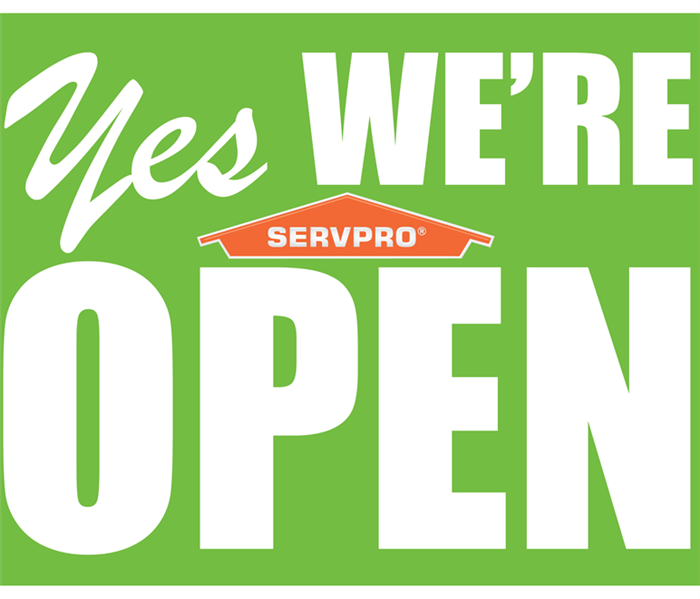 We are open during COVID-19 pandemic
We are open during COVID-19 pandemic
We wanted to take the time to express how deeply grateful we are to all the medical professionals and those who are fighting COVID-19 on the front lines. They are the real heroes in this battle and our hats go off to them.
As part of the emergency services restoration and clean up industry, our team is dedicated to responding to disasters in our clients homes and businesses. Our technicians specialize in the proper use of Personal Protective Equipment, which enable them to safely restore your property.
We are taking extra precautions during this pandemic to ensure the health and safety of our customers, clients and employees. Employees have been instructed to disinfect all pieces of equipment before and after each use, wear a clean pair of gloves at each visit and limit visits to only essential services.
We are here for our customers when their need is the greatest and we hope to fulfill those needs as safely as possible.
If you have any questions on the precautions we are taking during this time or on the services we provide, please feel free to contact us anytime at 626-447-4111. Our lines are open 24/7.
We hope that all of our customers stay safe and take care!
Spooky season is Coming!
10/9/2018 (Permalink)
The fall season is upon us and you know what that means? Yes, you guessed it right, Pumpkin Spice Lattes, the change in weather and who can forget Halloween!
We here at SERVPRO of Arcadia like to spice things up as well.This year we decided to change things up a little and not only dress ourselves up but have our 1st Annual Office Decorating Contest. The winner of this years contest received movies tickets and dinner for two. At SERVPRO of Arcadia we take competition very seriously. We have 8 offices in total and of the 8 offices Ms Flood proved herself to be the victor. Ms. Flood went above and beyond showcasing her creativity.
This only means that next year we have to bring our A game. Congratulations Ms Flood we'll patiently look forward to dethroning you next year!
Commercial Marketing Forum
10/31/2017 (Permalink)
 SERVPRO Commercial Marketing Forum
SERVPRO Commercial Marketing Forum
SERVPRO believes in the continuing education of its associates. That is why our local Franchise Trainers create marketing forums where we are able to share each others success stories. Focusing on putting our clients needs first.
At this year's marketing forum our guest speaker was Brandon Rohner a SERVPRO Commercial Marketing Consultant. With many years of expertise in the industry. He has been able to assist countless franchises with large losses such as commercial fire/water damage.
During our forum we focused on ways we can better help our clients prepare for a catastrophic loss. One of the ways we were able to achieve this, is by the SERVPRO Emergency Ready Plan. Its a profile designed to help businesses easily access vital information and key contact phone numbers needed during an emergency. If you own a business and would like to learn more about the SERVPRO Emergency READY Plan, then please call our Marketing Department at (626)447- 4128 for assistance.






 24/7 Emergency Service
24/7 Emergency Service











